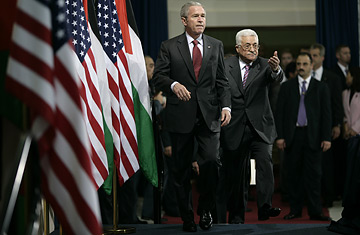
U.S. President George W. Bush and Palestinian Paresident Mahmoud Abbas arrive for the joint news conference after their meeting at the Palestinian Authority headquarters in West Bank city of Ramallah.
Bush's trip to Ramallah produced plenty of happy talk. He arrived at the dingy Palestinian presidential compound in the West Bank mid-morning, and went into an hour and a half of talks. At a press conference afterwards, Palestinian President Mahmoud Abbas said, "Peace in the world starts from here, from the Holy Land." Bush himself said, "If given a chance the Palestinian people will work for freedom," and said he was confident that there will be "a signed peace treaty by the time I leave office."
Bush capped the two days of talks Thursday evening with a restatement of U.S. goals for a peace deal as well as encouragement for both sides to pursue talks. But if it hasn't been already obvious, Bush's trip to Israel and the West Bank this week has made one thing abundantly clear: the Israelis and Palestinians aren't making peace anytime soon. Israel is as resistant to basic peace process concessions as it has always been and the Palestinians are alternately weak or violent, depending on which part of their territory you look at.
In response, the U.S. has delivered more talk than action since the Annapolis summit late last year, and some of that talk has been contradictory. When the hope and hoopla of Bush's trip to the region fades in coming days, the U.S. will need to come up with more realistic goals for the next twelve months of diplomacy. Otherwise it risks undermining the very regional leaders it says stand the best chance of making progress in coming years.
Bush had no deliverable achievements to announce from the two days of talks. Instead, he and his advisers pointed to the Palestinian and Israeli agreements, made in the days before he arrived, "on the modalities for going forward with negotiations," according to National Security Adviser Stephen Hadley. These include biweekly meetings between Abbas and Israeli Prime Minister Ehud Olmert and lower-level meetings.
At Annapolis, the U.S. promised to moderate confidence-building talks; and Washington has named a low-profile, three-star general to lead the process, consulting with each side and collecting the complaints lodged by one party against the other. At the Ramallah press conference, Bush dismissed questions about the sluggish diplomacy, saying that it was up to the Palestinian and Israeli leaders to take the tough steps. "The only way to have lasting peace, the only way for an agreement to mean anything, is for the two parties to come together and make the difficult choices."
Bush showed sympathy for each sides' complaints, but applied no apparent pressure. On Wednesday Bush backed Israeli Prime Minister Ehud Olmert's assertion that Abbas needs to stop Hamas rocket attacks before there can be progress on peace. On Thursday he said he understood frustration over continuing limits Israeli forces place on Palestinian movements. Yet neither Israeli nor the Palestinian leaders showed signs of having been squeezed to take action. Said Olmert, "The President didn't ask for me to make any commitments other than the ones that Israel made already."
The big-talk, little-action approach takes place against a backdrop of continuing tension. Rocket attacks from Gaza into Israel continued right up to Bush's arrival in Jerusalem. And Israeli forces raided Nablus in the West Bank earlier this month.
Expectations of progress on the Palestinian and Israeli sides are in fact limited. A senior Israeli official told TIME that despite the rhetoric, Olmert doesn't expect Abbas to end rocket attacks from Gaza, which is controlled by the Islamic radicals of Hamas, who have broken away violently from Abbas's government in the West Bank. "We understand that he's limited in what he can do today," the official says. On the Palestinian side, Abbas is looking as much for the political boost a functioning peace process would give him over Hamas as he is for a final deal. From the Palestinian perspective, says Gaith al Omari, a former adviser to Abbas, "The Annapolis process is about giving Abbas ascendancy over Hamas. A credible process will take him a long way towards establishing his authority."
The realistic approach for the U.S. is to ratchet back the rhetoric to match both sides' low expectations, and at the same time start applying real pressure to get some progress on day-to-day confidence building measures. That pace may mean a long, slow effort that will stretch into the next administration, but the alternative is to undermine the credibility of Abbas and Olmert with unachievable goals.
